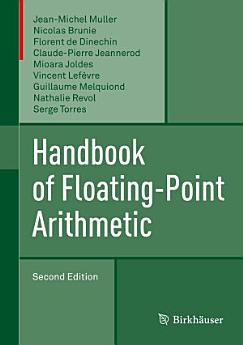Handbook of Floating-Point Arithmetic: Edition 2
Jean-Michel Muller · Nicolas Brunie · Florent de Dinechin · Claude-Pierre Jeannerod · Mioara Joldes · Vincent Lefèvre · Guillaume Melquiond · Nathalie Revol · Serge Torres
May 2018 · Birkhäuser
Ebook
627
Pages
reportRatings and reviews aren’t verified Learn More
About this ebook
This handbook is a definitive guide to the effective use of modern floating-point arithmetic, which has considerably evolved, from the frequently inconsistent floating-point number systems of early computing to the recent IEEE 754-2008 standard. Most of computational mathematics depends on floating-point numbers, and understanding their various implementations will allow readers to develop programs specifically tailored for the standard’s technical features. Algorithms for floating-point arithmetic are presented throughout the book and illustrated where possible by example programs which show how these techniques appear in actual coding and design.
The volume itself breaks its core topic into four parts: the basic concepts and history of floating-point arithmetic; methods of analyzing floating-point algorithms and optimizing them; implementations of IEEE 754-2008 in hardware and software; and useful extensions to the standard floating-point system, such as interval arithmetic, double- and triple-word arithmetic, operations on complex numbers, and formal verification of floating-point algorithms. This new edition updates chapters to reflect recent changes to programming languages and compilers and the new prevalence of GPUs in recent years. The revisions also add material on fused multiply-add instruction, and methods of extending the floating-point precision.
As supercomputing becomes more common, more numerical engineers will need to use number representation to account for trade-offs between various parameters, such as speed, accuracy, and energy consumption. The Handbook of Floating-Point Arithmetic is designed for students and researchers in numerical analysis, programmers of numerical algorithms, compiler designers, and designers of arithmetic operators.
The volume itself breaks its core topic into four parts: the basic concepts and history of floating-point arithmetic; methods of analyzing floating-point algorithms and optimizing them; implementations of IEEE 754-2008 in hardware and software; and useful extensions to the standard floating-point system, such as interval arithmetic, double- and triple-word arithmetic, operations on complex numbers, and formal verification of floating-point algorithms. This new edition updates chapters to reflect recent changes to programming languages and compilers and the new prevalence of GPUs in recent years. The revisions also add material on fused multiply-add instruction, and methods of extending the floating-point precision.
As supercomputing becomes more common, more numerical engineers will need to use number representation to account for trade-offs between various parameters, such as speed, accuracy, and energy consumption. The Handbook of Floating-Point Arithmetic is designed for students and researchers in numerical analysis, programmers of numerical algorithms, compiler designers, and designers of arithmetic operators.
About the author
Jean-Michel Muller (coordinator), CNRS, Laboratoire LIP, AriC teamNicolas Brunie, KalrayFlorent de Dinechin, INSA Lyon, Laboratoire CITI, Socrate teamClaude-Pierre Jeannerod, Inria, Laboratoire LIP, AriC teamMioara Joldes, CNRS, LAAS, MAC teamVincent Lefèvre, Inria, Laboratoire LIP, AriC teamGuillaume Melquiond, Inria, Laboratoire LRI, Toccata teamNathalie Revol, Inria, Laboratoire LIP, AriC teamSerge Torres, ENS de Lyon, Laboratoire LIP, AriC team
Rate this ebook
Tell us what you think.
Reading information
Smartphones and tablets
Install the Google Play Books app for Android and iPad/iPhone. It syncs automatically with your account and allows you to read online or offline wherever you are.
Laptops and computers
You can listen to audiobooks purchased on Google Play using your computer's web browser.
eReaders and other devices
To read on e-ink devices like Kobo eReaders, you'll need to download a file and transfer it to your device. Follow the detailed Help Center instructions to transfer the files to supported eReaders.





